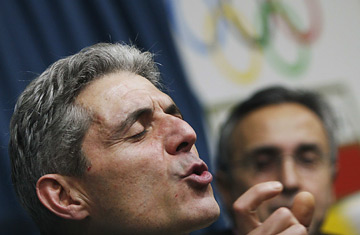
Paulino Cubero, author of the proposed lyrics for the Spanish national anthem
"Viva España! From the green valleys to the vast sea, a hymn of brotherhood." After four months, six experts, and 7000 entries to propose lyrics for the Spanish national anthem, one might be forgiven for asking: is that really the best they can do?
And one would not, it seems, be alone in asking.
For decades Spain's athletes have stood awkwardly on awards podiums, forced to hum their wordless anthem while winners from elsewhere sang their paeans to national glory. In October, the Spanish Olympic Committee, seeking to bring an end to their suffering, launched a competition to put words to the Marcha Real, Spain's official tune since the 18th century. When the contest opened, doubts ran high that a country with so many distinct — and antagonistic — political identities would be able to settle on a single set of lyrics. But when the winning words were leaked to the Spanish newspaper ABC on Friday, politicans across the political spectrum showed surprising agreement in their reception of the proposed lyrics: they hated them.
Socialist Carmen Calvó, a former minister of culture, was blunt: "I don't like them at all. They're antiquated." United Left leader Gaspar Llamazares, objecting in particular to the Franco-esque ring of that "Viva España!," called them "stale." Artur Mas, leader of the Catalan party Convergence I Unio, sniped, "With words like this, I don't think you'll see me singing it much." Even the conservative Popular Party, which has made the addition of anthem lyrics part of its campaign platform, could manage only a tepid response. "They don't seem bad to me," said PP congressional leader Jorge Fernández Díaz.
The lyrics failed to engender much enthusiasm among ordinary Spaniards either. As a result the Spanish Olympic committee withdrew them on Wednesday, just days after it announced a winner. Gone is the gala, scheduled for January 21, at which Plácido Domingo was to perform the newly worded anthem for the first time. Gone is the effort to gather 500,000 supporting signatures so that the lyrics might be submitted to parliament for official approval. And gone, once and for all, is "glory to the sons who gave to history justice and greatness, democracy and peace."
Were the new lyrics much worse than those of other countries? In its banal catalogue of local scenery and anodyne call for brotherly love, the winning entry is hardly alone (Austria: "Land of mountains, land on streams, land of fields, land of cathedrals"; Canada: "True patriot love in all thy sons command"). Admittedly countries like Norway and India do better than most with the same elements, but they had Nobel laureates (Bjornstjerne Bjornson and Rabindranath Tagore respectively) writing their lyrics. And if some nations have tended to whip up enthusiasm with a ribald reference or two (the now decertified second verse of the German national anthem can read like a gleeful celebration of sex and drunkenness), others rely on bombs bursting in air and other martial images for their oomph. France's La Marseillaise may be the most stirring of any national anthem (or so it sounded coming from the lovely mouth of Ingrid Bergman in Casablanca), but you have to ask: are fields soaked in impure blood really the most fitting image for a modern anthem?
Paulino Cubero, the unemployed 52-year-old who won the content, had said he wrote the words "for the nation of average people who take the subway to work and pay their mortgages." But even subway riders and mortgage payers, it seems, are critics. Announcing the recall, Spanish Olympic Committee president Alejandro Blanco explained that "the lyrics just didn't have broad support among Spanish society." A disappointed Cubero was more pointed. "These are the miseries of our nation," he said. "We can only talk about different nations, not a shared one."
